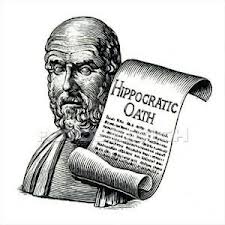Hippocrates lived between 460-377 B.C. and was known as the “father of medicine.” He was granted this title because he essentially took the development of naturalistic medicine to new heights by overcoming the previous medical beliefs centered around superstition and magic. He believed that illnesses had natural, not supernatural causes. He thought that there were four humors in the body, black bile, yellow bile, blood, and phlegm which were associated with the commonly accepted four elements (earth, air, fire, water). When these humors were naturally and properly balanced, people are healthy. When there is an imbalance among the humors, there is sickness and illness.
As we can clearly see, Hippocrates and his set of beliefs were focused on the fall as well as the idea of new creation and restoration. Hippocrates observed and rationally analyzed sickness and pain, and that is a direct reflection of the idea of the fall of man. Because he believed that sickness was caused by the imbalance of the humors of the body, there is a perceived association that to be healthy, there needs to be balance and harmony within the body among these humors. This dreaded imbalance can be associated with the fall, which is simply a corruption of the natural world (due to sin in the case of our beliefs). In a world of perfect creation, there would be no sickness, but through observable evidence we have fallen.
Even though there is imbalance and sickness, Hippocrates also believed in a sense of restoration of the body. He believed that the body has the ability to heal itself and that it was the physicians job only to “facilitate natural healing.” In fact, he believed that the worst thing a physician could do was interfere with the body’s natural healing power. From these beliefs alone we have enough evidence to associate Hippocrates with the idea of restoration. There is imbalance and imperfection caused from the fall, and the body has the ability to regain this natural and desired balance and harmony. Regaining balance and health is synonymous to the idea portrayed by restoration, where we are born again and brought back into a sense of cleanliness and harmony.


Meredith Thornton
1:58 pm, 09.07.13
I hadn’t thought of Hippocrates in this way before Zach, but I think it’s a very interesting approach. Breaking down his views of how the body stays healthy and recovers from sickness makes a compelling argument for his views to be associated with the last three stages of the theologic narrative as you have presented them.
Jennifer Valenzuela
3:10 pm, 09.08.13
This is really good Zach. I like how there is somewhat of a philosophical explanation for the fall.
Matt McMahon
3:30 pm, 09.08.13
While I agree with you and also probably would have categorized hippocrates under Fall if I had chosen to write about him, something you said made me think. I believe that their could be a case made to say that some of his ideas may inform the category of redemption. His ideas of the humors seem to explain why people get sick but he also believed that if they were to be balanced they could be made well again so in that way he seems to be taking somewhat of a redemptive approach.
Zach Stromberg
3:39 pm, 09.08.13
Yeah, I agree with you Matt. I thought about that after I posted this. The natural re-balancing of the body to lead to restoration definitely falls under the mindset of redemption.
Denysha Taylor
7:38 am, 09.10.13
Great job with Hippocrates! I really like your comparisons of sickness/imbalance with the Fall. You also made one with regaining health/balance with Restoration. It reminds me of a relationship with God. Sometimes life gets chaotic and that spiritual connection is lacking, which just makes it so much worse. But when an individual turns around and starts to take steps to restore that relationship with God, things start falling back into place. I agree that Hippocrates fits very well in both of those categories.